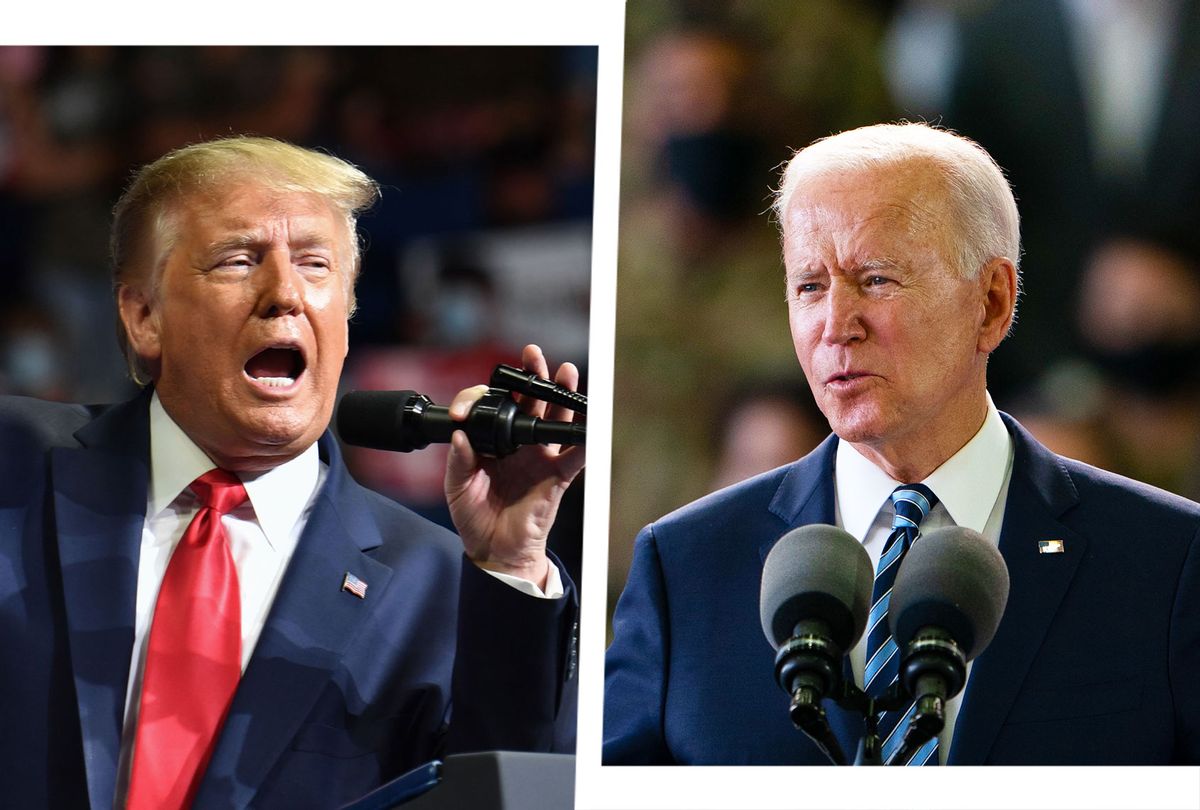The United States' image around the world has rebounded since the election of President Joe Biden — however many countries now no longer view the U.S. as a "good model" of democracy.
Confidence in the U.S. to "do the right thing" has surged from 17% under former President Donald Trump in 2020 to 75% under Biden, according to a Pew Research survey of 12 countries ahead of Biden's first overseas trip this week. Residents of foreign nations, particularly key U.S. allies, "held the United States in low regard" throughout Trump's presidency, but the favorable opinion of the U.S. has increased by 34% in the 12 countries surveyed.
"The election of Joe Biden as president has led to a dramatic shift in America's international image," Pew's researchers concluded.
The survey also found a massive gap in the world's confidence in Biden compared to Trump. Just 10% of Germans and 11% of the French said they had confidence in Trump last year compared to more than 70% who say they have confidence in Biden. Just 16% of residents in the countries surveyed said Trump was "well-qualified" to be president in 2017, compared to 77% who view Biden as well-qualified. More than 70% viewed Trump as "dangerous" and 90% viewed Trump as "arrogant" but both numbers are below 15% for Biden.
Support for Biden appears to be linked to his policies, as overwhelming majorities of the countries surveyed approved of the US rejoining the Paris climate agreement and the World Health Organization, both of which the president did on his first day in office.
But the Trump years appear to have shaken the world's confidence in the US democracy after Biden's predecessor tried to overturn his win and inspired his supporters to riot through the Capitol in a feeble attempt to block the certification of the results. Only 17% of those surveyed said they believe the US democracy is a "good example for other countries to follow." By comparison, 57% said the US "used to be a good example, but has not been in recent years." About 23% said the US "has never been a good example for other countries to follow." Only about 50% said the US political system is working well and 56% view the US as somewhat reliable while just 11% describe the US as "very reliable."
Biden has sought to rebuild the country's relationship with its allies after Trump spent years attacking foreign partners and global organizations. The administration announced this week it will buy 500 million doses of Pfizer's coronavirus vaccine to donate to countries around the world through the COVAX alliance. The doses will be distributed among 92 lower-income countries and the African Union. The donation is five times more than the number of doses that COVAX has distributed in total.
"We're going to help lead the world out of this pandemic working alongside our global partners," Biden said on Friday after arriving in England for the G-7 summit, adding that there would be "no strings attached" nor "pressure for favors."
"In times of trouble, Americans reach out to offer help," Biden said. "Our values call on us to do everything that we can to vaccinate the world against COVID-19… We're doing this to save lives, to end this pandemic, and that's it."
Biden touted his commitment to working with allies to tackle the pandemic, the climate crisis, and aggression from China and Russia in a Washington Post op-ed ahead of his trip. The Biden administration has already hammered out an agreement among the G-7's finance ministers to work toward a 15% global minimum corporate tax and the president said his meetings will focus on pandemic recovery, clean energy, revamping the world's physical and digital infrastructure, and countering authoritarianism.
"Those shared democratic values are the foundation of the most successful alliance in world history," Biden said, vowing to affirm the country's "unwavering commitment" to NATO allies. "We will focus on ensuring that market democracies, not China or anyone else, write the 21st-century rules around trade and technology. And we will continue to pursue the goal of a Europe whole, free and at peace," he wrote.
Biden is also expected to meet with Russian President Vladimir Putin in Geneva after the summit in what is expected to be a sharp break from Trump's friendly outreach to Putin during his term.
"We are standing united to address Russia's challenges to European security, starting with its aggression in Ukraine, and there will be no doubt about the resolve of the United States to defend our democratic values, which we cannot separate from our interests," Biden wrote, vowing to underscore the West's commitment to "stand up for human rights and dignity."
"This is a defining question of our time: Can democracies come together to deliver real results for our people in a rapidly changing world?" he wrote. "Will the democratic alliances and institutions that shaped so much of the last century prove their capacity against modern-day threats and adversaries? I believe the answer is yes. And this week in Europe, we have the chance to prove it."



Shares